

Q U A R T E R L Y N E W S L E T T E R
IN THIS ISSUE:
Community Schools: Togetherness in Making a Difference
Creating a Healthier Baltimore, One Family at a Time
Investing in Youth to Combat Learning Loss
School Readiness Programs: Building Foundations for Success
BY JENEE TUCKER, FAMILY LEAGUE SR. DIRECTOR FOR COMMUNITY IMPACT
Our School Readiness programs are at the heart of Family League’s commitment to early childhood development, striving to equip every child in Baltimore with the skills and support needed to thrive from the very beginning of their educational journey. Below are highlights of key achievements and significant progress within this crucial area.
Early Childhood Advisory Council (ECAC)
ECAC is pleased to announce a partnership with Strategic Thinking for Social Change and the Baltimore Educational Research Consortium to update the Baltimore City Early Childhood Landscape analysis. This initiative, funded by a grant from the Maryland State Department of Education, will provide a comprehensive overview of the 0-5 population, assess early childhood education services, and identify areas for improvement. Led by Martha Hollemon, the updated report is anticipated by September 2024.
Simultaneously, the ECAC’s Open Heart workgroup has joined forces with Spark Solutions Consulting to develop an inclusive family engagement strategy. This strategy will ensure that families consistently have a voice in the ECAC’s early childhood initiatives, addressing the need for broader family representation. This project is also expected to be completed by September 2024.
Additionally, the Mixed Delivery Ad Hoc workgroup is collaborating with consultant Danielle Ewin to implement a mixed delivery Pre-K system in Baltimore. Recent legislative changes have created new opportunities, and we are optimistic about the positive impact these changes will bring. This system will integrate both public and private providers, ensuring greater access to high quality Pre-K options for all families. By fostering collaboration across sectors, the workgroup aims to create a more equitable and sustainable early education system in Baltimore.
Home Instruction for Parents for Preschool Youngsters (HIPPY)
HIPPY is an evidence-based home visiting program that emphasizes the importance of parents as their child’s first teacher. HIPPY Baltimore is a partnership between Family League and our funded partners: Park Heights Renaissance, Learning How! Early Childhood Development Center, and UMBC’s Sherman STEM Teacher Scholars Program. This year, HIPPY Baltimore made significant strides, serving 109 parents. Notably, 100% of surveyed parents reported that the program effectively prepared their children for kindergarten. In May, HIPPY partners celebrated their first full year as a three-site program with a "Turn the Curve Conversation." Additionally, B’More for Healthy Babies invited HIPPY staff to their Refresh event, offering home visiting staff from across the city a day of self-care. Moreover, our School Readiness Program Director, Yolanda Jenkins, was invited to present at a HIPPY U.S. meeting, where she highlighted our Home Visitor Workforce Development Training Program.
Hoffberger Family Philanthropies Workforce Development
In May, we issued a Request for Qualifications (RFQ) for a consultant to support HIPPY parents who are graduates of our home visitor workforce development program. This consultant will provide individualized support to graduates, assist with removing barriers, and help evaluate the program. We are excited to embark on this next phase and continue supporting our workforce development graduates.
Children Enter School Ready to Learn
Our funded partner, Improving Education, has expanded their All Children Ready program by partnering with five new Head Start sites. A recent site visit and virtual meeting emphasized the program’s positive impact, with Head Start staff appreciating the handson planning, support, and data sharing.
Family League remains dedicated to nurturing Baltimore’s youngest learners, laying a strong foundation for lifelong success. We look forward to continuing this vital work and making a lasting impact on our community.
Jenee Tucker is the Senior Director for Community Impact at Family League, where she stewards a $12 million budget to support education initiatives such as School Readiness, Community Schools, and Youth Development programs. With over two decades of experience, Jenee excels in managing evidence-based programs, leading a team of Program Directors, and collaborating with stakeholders to ensure equitable grant-making and program effectiveness.
She joined Family League in 2016, rising through the ranks to her current role in 2024. Previously, Jenee worked with Baltimore City Public Schools and Big Brothers Big Sisters of Central Maryland. A Baltimore native, she holds an M.S. in Project Management from Morgan State University and a B.S. in Criminal Justice from Virginia Union University.
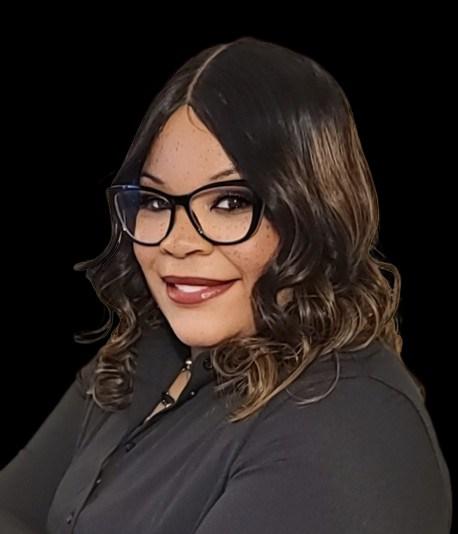


MEET JENEE TUCKER SUMMER
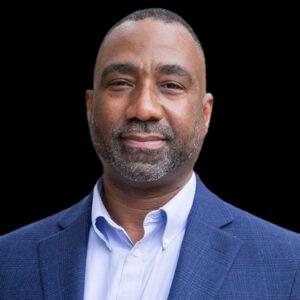

Demaune Millard
A MESSAGE FROM OUR CEO
Empowering Baltimore’s Future: A Vision of Hope and Action
DEMAUNE MILLARD, FAMILY LEAGUE
Family League’s commitment to transformative change through collaboration and innovation remains essential to delivering positive impact for families
Dear Friends and Partners of Family League,
As we reflect on this past summer and look toward the months ahead, I am filled with gratitude for the remarkable progress we’ ve made together. Baltimore continues to evolve, and it’ s your unwavering support, the resilience of our communities, and the innovation that defines Family League that makes this transformation possible.
Strengthening Partnerships for Baltimore’s Future
Over the last few months, Maryland has taken significant steps to address child poverty and expand economic opportunities. The introduction of the Engaging Neighborhoods, Organizations, Unions, Government, and Households (ENOUGH) Act earlier this year set the stage for collaborative community investment. More recently, the Maryland Governor’s Office for Children launched the ENOUGH Grant Program, a statewide initiative designed to empower communities to create opportunities from within.
As a longstanding partner in supporting Baltimore’s children and families, Family League is well positioned to build upon this work. The ENOUGH initiative complements our ongoing partnerships and funding relationships, including our vital collaboration with the Baltimore City Council and the Mayor’s Office of Children and Family Success. This initiative underscores how critical city, state, and community organizations are to solving complex social challenges together.
Inspiration and Collaboration
Earlier this summer, I had the privilege of attending the “Shaping Our Shared Future: A Child Poverty Summit” hosted by the Maryland Philanthropy Network and the William Julius Wilson Institute at Harlem Children’s Zone. This gathering of leaders across sectors sparked innovative strategies and reaffirmed our mission to address economic mobility and child poverty in Baltimore. Hearing from Governor Wes Moore and Geoffrey Canada, founder of Harlem Children’ s Zone, left us more determined than ever to tackle these pressing challenges.
Our commitment to youth development remains central to this mission. This summer’ s “Show What You Know” event at Morgan State University, served as a powerful reminder of the incredible potential within Baltimore’s youth. With over one million dollars invested in summer programming, we continue to provide opportunities for year -round growth and learning.
Looking Ahead
As we move into the latter part of the year, we’re excited to announce the upcoming launch of our new INSIGHT data management system. This tool will revolutionize how we collect and analyze data, enabling us to make more informed decisions and measure our impact with greater precision. This multi-year commitment to innovation and technology is a reflection of Family League’s dedication to delivering the best interventions for Baltimore families.
While we have made great strides, challenges remain. From the turnover in partner organizations to the ongoing effects of systemic inequities on our youth and families, these hurdles only reinforce our determination to apply a racial equity lens to our work and seek innovative solutions that address the root causes of inequality in our city.
Together, we are not just serving Baltimore we are transforming it. We envision a city where opportunity is abundant, where families are supported, and where every child can reach their full potential. This vision is more than an aspiration; it’ s a commitment we renew every day through our actions and partnerships.
Thank you for your continued dedication to our shared mission. Let’s continue pressing forward, embracing innovation, and creating lasting change in Baltimore’s families.
With gratitude and determination,
Demaune A. Millard President & CEO
To support youth development and fight summer learning loss, Baltimore’s Family League allocated over $1.5 million to 26 community organizations for summer programming in 2024. The ambitious effort provided structured learning opportunities for youth across the city, with a particular emphasis on addressing the often-overlooked needs of older teens and young adults.
Bridging the Gap for Older Youth
While efforts were made to fund programs for all ages, there was a deliberate focus on filling a critical gap in services for older youth. Recognizing the unique challenges faced by teenagers and young adults, Family League directed significant resources to programs serving those aged 14 to 24.
"High-quality summer programs can help level the playing field," says Jenee Tucker, Sr. Director for Community Impact at Family League. "They support students academically and socio-emotionally in safe and supportive environments."
Nearly half of the funded programs are specifically designed for high school students and older youth, reflecting a commitment to this underserved demographic.
A
Mosaic of Opportunities
The funded programs represented a diverse array of focus areas including: arts and culture, sports and recreation, college
and career readiness, STEM education, workforce development, literacy, and social-emotional learning. This variety ensured that Baltimore's youth had access to a wide range of enriching experiences tailored to their interests and needs.
Innovative Programs Taking Center Stage
Several standout programs highlighted the creativity and ambition of this year's initiatives:
The R.I.S.E Emerging Artists internship offered a 5-week course in mural art, architecture, and brand experience for neurodivergent teens and young adults. Participants created a vibrant mural at the historic Eubie Blake Jazz and Cultural Arts Center, infusing it with their unique perspectives.
10-12 Sports combined flag football with mentoring and job skills training for teenage males. The program included character lessons, physical activities, and a paid game day jobs program to help teens master soft skills while earning money.
Let's Thrive Baltimore's Youth Empowerment Summer Program (YES Program) provided an 8-week immersive experience offering career-focused courses, mentorship opportunities, and support services. Participants were able to earn certifications in high-demand fields such as forklift operation, coding, and phlebotomy.
cont. on page 4
City-wide Community Impact Summer Youth Investments for 2024
Family League’s funding decisions reflected a strong commitment to equity and community representation
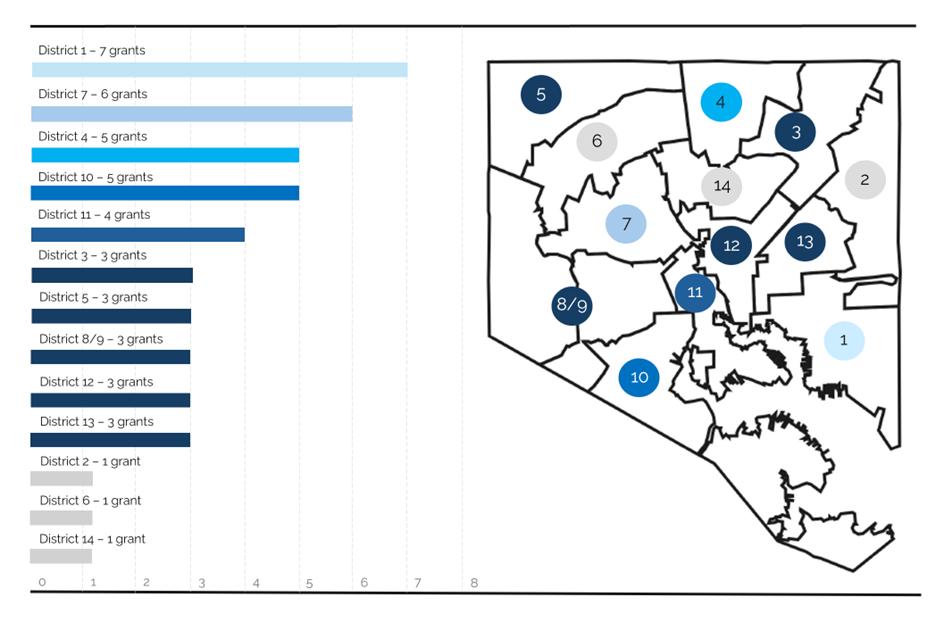
Baltimore’s 14 City Council Districts
Family League's funding decisions reflected a strong commitment to equity and community representation:
• 70% of funded organizations were minority-owned or led
• 96% were Baltimore-based
• 52% were women-owned or led
The majority of youth served were Black, Indigenous, and people of Color (BIPOC), immigrant, LGBTQIA+, and neurodivergent youth.
"We're intentional about balancing resources to support existing needs," Demaune Millard, President and CEO of Family League explains. "Our diverse Community Advisory Board played a crucial role in reviewing and scoring applications so that we were able to reach those who needed it most."
Measuring Impact and Ensuring Quality
To maximize the impact of this significant investment, Family League required funded partners to adhere to the Youth Program Quality Assessment framework. This included maintaining safe and supportive environments, employing competent staff, and incorporating youth voice and leadership into programming.
Partners collaborated with stakeholders, operated primarily inperson programming, and provided innovative, intentional programming with engaged learning components.
"Regular attendance in high-quality summer programs improves relationship skills, creates a sense of agency, and strengthens youth participants' assets," notes Tucker. "We're committed to helping youth stay safe, engaged, and reduce summer learning loss."
A City-Wide Effort
The funded programs operated across more than 18 zip codes in Baltimore, with a notable concentration of eight programs in East Baltimore. This geographic spread ensured that opportunities are accessible to youth throughout the city.
As Family League and others await the results of this significant investment, hopes are high that these programs provide a summer of growth, learning, and opportunity for the city's youth. With projections suggesting that over 2,000 young people may be served, the potential impact on the community is substantial.
The success of this initiative could serve as a model for other cities grappling with similar challenges in youth engagement and summer learning loss. As the programs unfold, the Mayor Brandon M. Scott, Baltimore City Council, and Family League look forward to seeing how this bold investment in youth development pays off for the city’s future.
In a landmark move to address generational poverty, Maryland Governor Wes Moore signed the Engaging Neighborhoods, Organizations, Unions, Governments, and Households (ENOUGH) Act into law on May 9, 2024. The initiative, officially launched in July, represents a pioneering $20 million state-led, place-based strategy to fight child poverty and boost economic mobility across Maryland.
"Those closest to the problems are closest to the solutions," Governor Moore stated. "By moving in partnership with local leaders and village elders, Maryland is writing a new chapter in our work to end child poverty. ENOUGH will be a rallying cry all throughout the State of Maryland."
ENOUGH and Maryland’s Local Management Boards
As Maryland's largest Local Management Board (LMB), Family League plays a crucial role in this innovative approach. LMBs are integral to overseeing local interagency service delivery systems for children, youth, and families. Since 1991, Family League has served as the designated LMB for Baltimore City, working tirelessly to bring key stakeholders together and make strategic investments in programs that impact lives.
The ENOUGH Initiative stands out for its community-driven focus, empowering local leaders to design and implement povertyfighting strategies. This approach marks a significant shift in how states address systemic inequities, recognizing that effective solutions must be tailored to the unique needs of each community.
"Family League is proud to stand alongside our fellow LMBs in supporting this groundbreaking initiative," said Demaune Millard, CEO of Family League. "By centering community
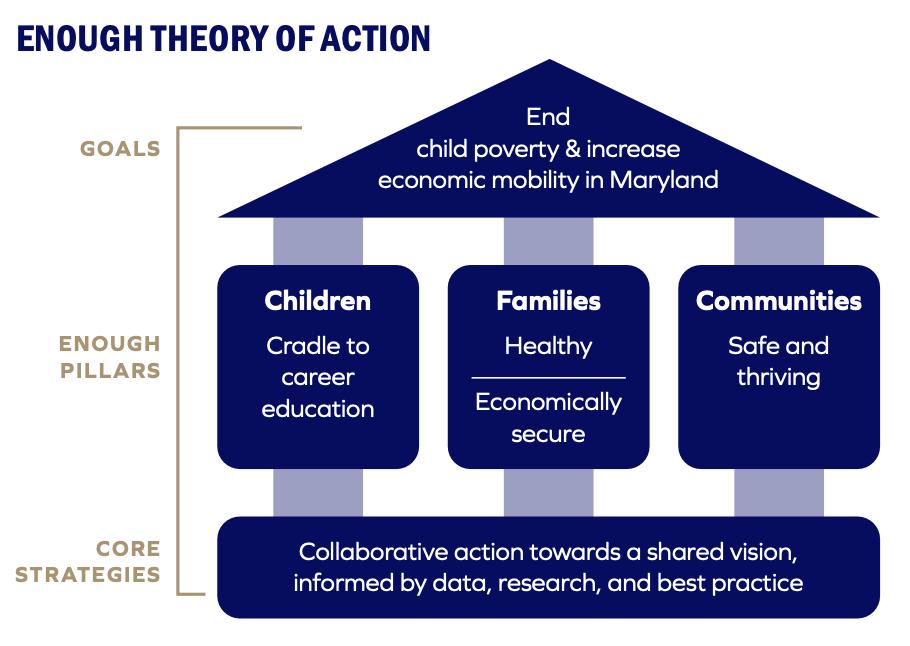
expertise and fostering cross-sector partnerships, ENOUGH represents a transformative approach to ending child poverty. We are committed to leveraging our resources and networks to ensure its success in Baltimore and beyond."
With its emphasis on data-driven solutions and wraparound services, ENOUGH aims to create a sustainable support system for Maryland's most vulnerable children and families. The initiative offers multiple funding tracks, allowing communities at different levels of readiness to participate and progress over time.
As the ENOUGH Initiative unfolds, Family League remains dedicated to bringing the right partners to the table and making strategic investments that will make a real difference in communities across the state. By combining state resources with local expertise, Maryland is poised to become a national leader in the fight against child poverty.
Final Site Leadership Meeting for Expanded Youth Program Partners in May 2024
In a celebratory culmination of the year's efforts, Family League hosted its final Site Leadership Meeting for Expanded Youth Programming (EYP) partners in May 2024. The event was a testament to the organization's commitment to both youth development and the well-being of community workers. Attendees were treated to a comprehensive professional development experience, focusing on essential selfcare practices, including yoga and daily stretching routines. The offsite gathering not only provided valuable skills but also fostered a sense of community among partners. Participants received swag bags from local vendors, emphasizing wellness and financial responsibility, underlining Family League's holistic approach to community support. The day concluded on a high note as funded partners were honored with heartfelt appreciation from internal teams and presented with Family League-branded certificates, personally signed by leadership, recognizing their invaluable contributions to Baltimore's youth.
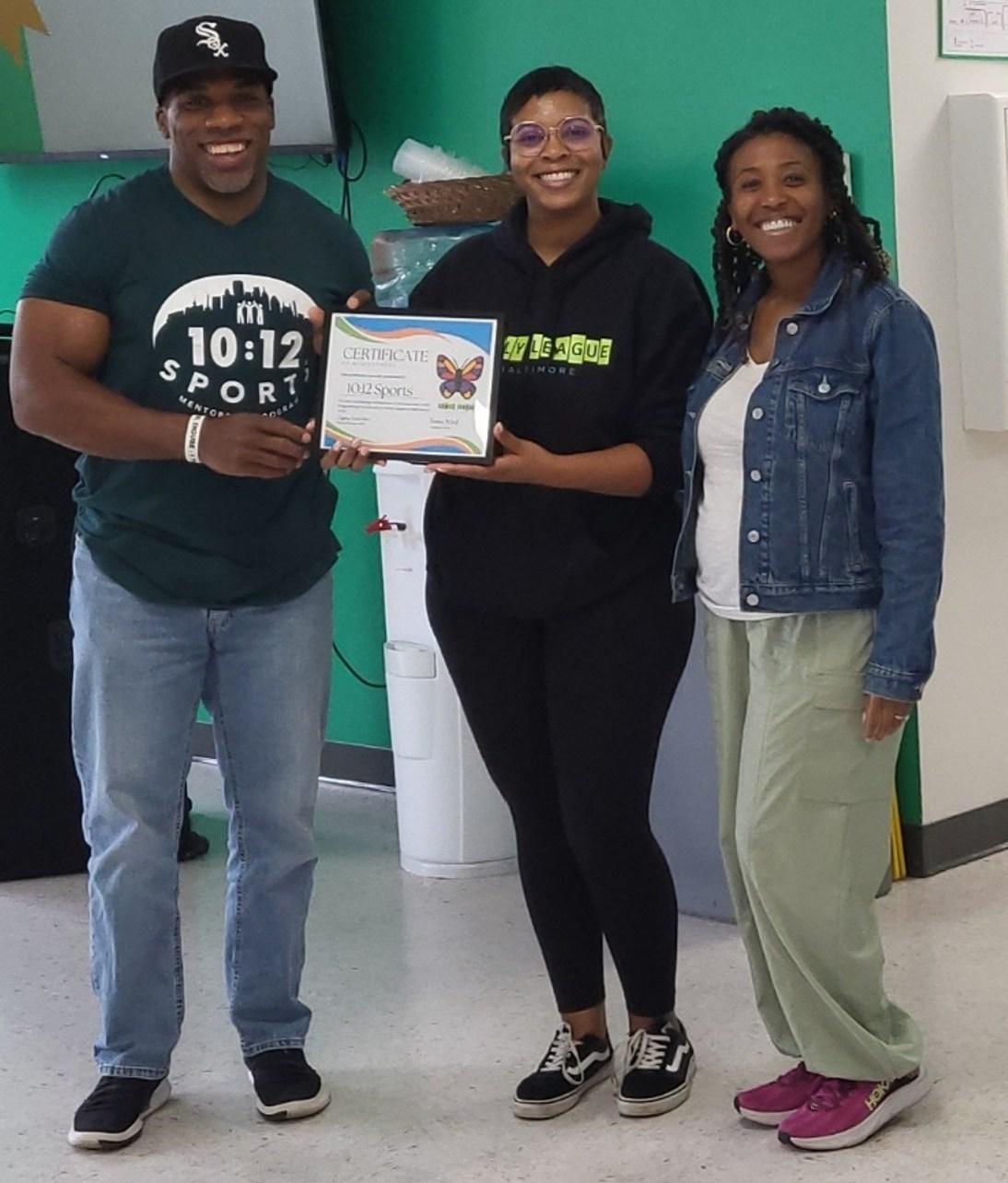

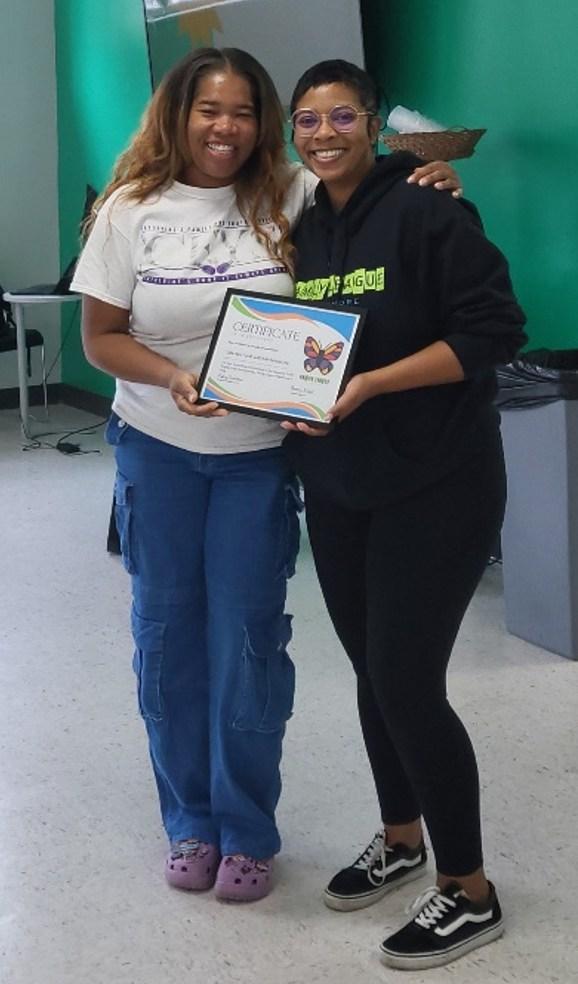
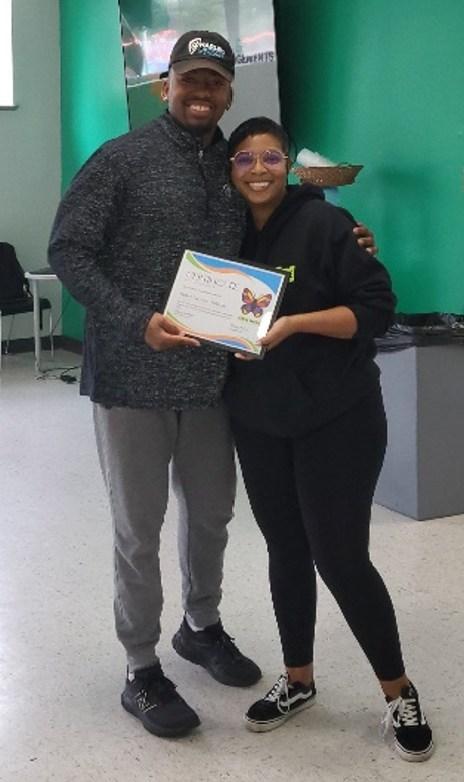


Family League provides coaching and professional development focusing on a wide range of topics that move our partners and the community as a whole closer to realizing the vision of a Baltimore where children, youth, and families have the opportunity to thrive.

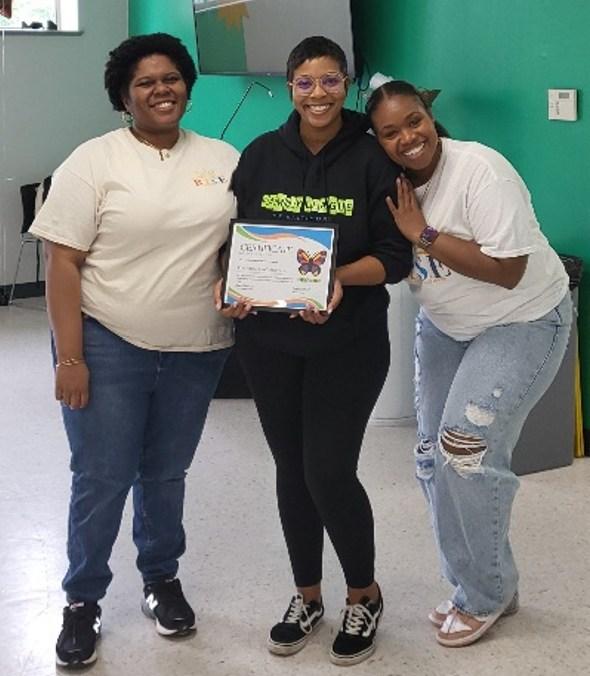

(ABOVE) Tiffany Snead Rose, Family League’s Program Manager of EYP is pictured with FY24 EYP funded partners (LtoR): Jeffrey Thompson and Ashley Hickson of 10:12 Sports, and (BELOW) Tiffany Snead Rose and Jasmin Manning and Kammeran Giggers of R.I.S.E. Arts Center of Baltimore.
(BELOW) Tiffany Snead Rose, Family League’s Program Manager of EYP is pictured with FY24 EYP funded partners (LtoR): Valerie Matthews of Catherine’s Family and Youth Services, and Raamah Harcum of Harlem Lacrosse,

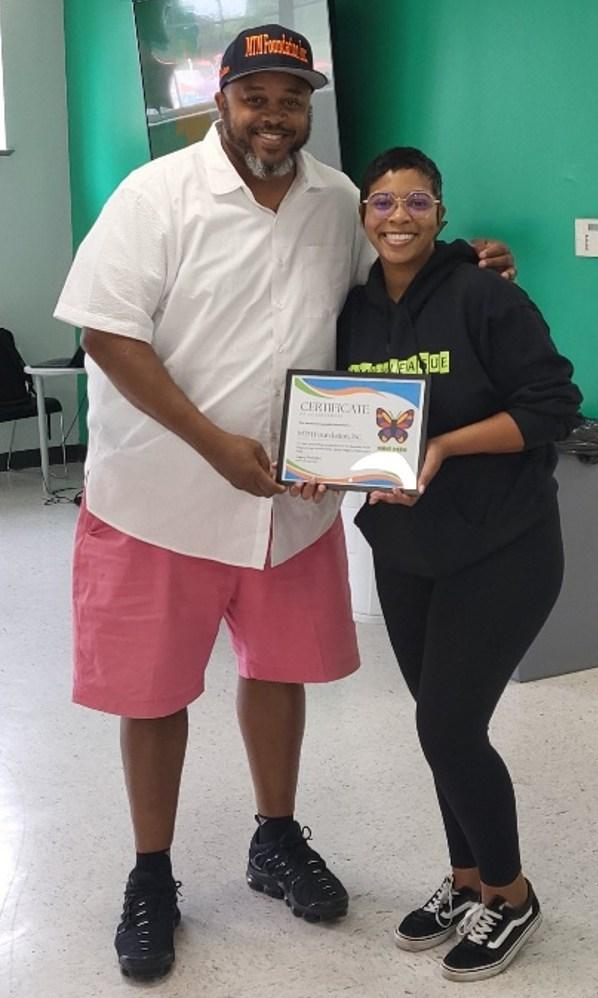
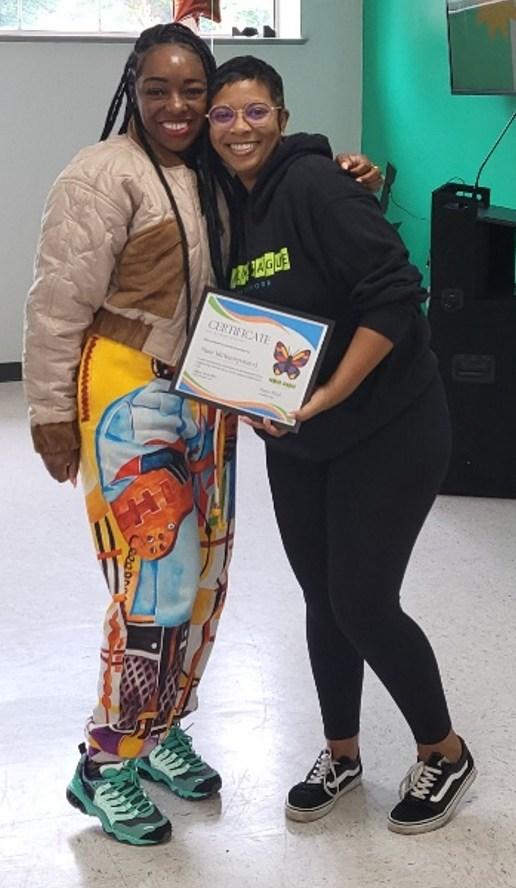

Family League provides coaching and professional development focusing on wide range of topics that move our partners and the community as a whole closer to realizing the vision of Baltimore where children, youth, and families have the opportunity to thrive. Participants in our workshops represent the diverse population of the City of Baltimore and the various needs of its residents. We deliver the most current research and best practices to support well-designed, high impact programs and activities.
We offer a variety of workshops throughout the year. All are free of charge to participants and open to anyone who wishes to attend. To view the complete listing and register for our workshops, visit our Community Professional Development Calendar on Family League’s website.
Link: https://familyleague.org/our-impact/professionaldevelopment/
The Community Professional Development Calendar offers over 50 free workshops, both in-person and virtual, covering a wide range of topics. From CPR certification to undoing racism, from data visualization to supporting LGBTQIA+ youth, these sessions have equipped professionals with vital skills and knowledge.
As we look to the future, Family League remains dedicated to fostering growth, innovation, and excellence in youth services through ongoing professional development opportunities.
We offer a variety of workshops throughout the year. All are free of charge to participants and open to anyone who wishes to attend.
Tiffany Snead Rose, Family League’s Program Manager of EYP is pictured with FY24 EYP funded partners (LtoR): James Henderson of MTM Foundation, and Sharayna Christmas of Muse 360.
Baltimore’s Community Schools: Togetherness in Making a Difference
A Two-Day Summer Institute Unites Over 150 Coordinators to Enhance Student and Community Success
On a warm June morning, Patterson High School buzzed with activity as over 150 Community School Coordinators gathered for the 2024 Summer Institute. This twoday event, a collaborative effort between Family League, the Mayor's Office, and Baltimore City Public Schools, marks a significant milestone in the city's commitment to reimagining education.
Baltimore's Community Schools, now numbering 154, represent the largest network of their kind in any Maryland jurisdiction. These are not your typical educational institutions. They serve as vibrant hubs, uniting families, communities, and partners to dismantle barriers to learning and

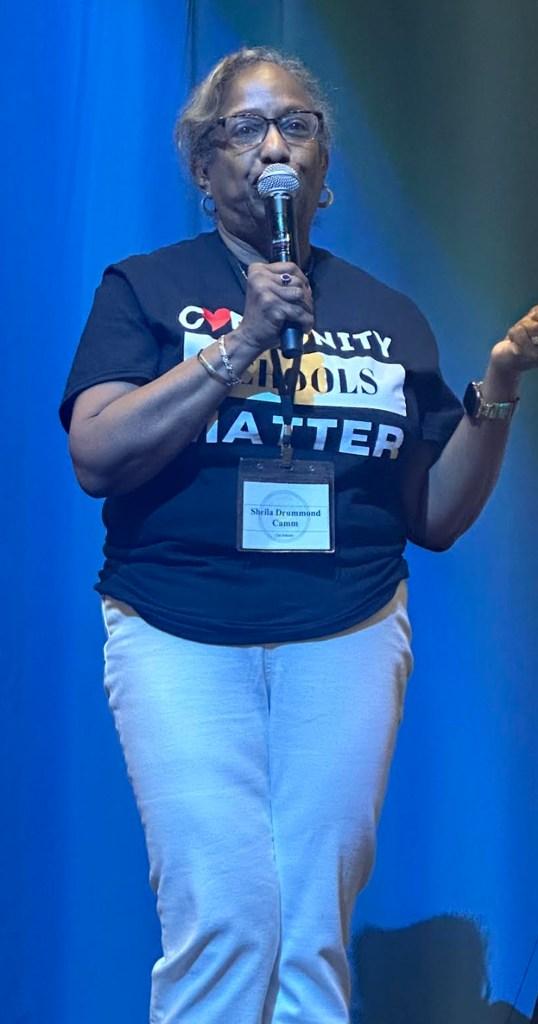
The Community School Transformation Framework
At the heart of this initiative is the Community School Transformation Framework, a comprehensive approach that integrates academics with health and social services, community development, college and career readiness, and family engagement. It's a holistic vision of education that extends far beyond the classroom walls.
Dr. Lawrence T. Brown, an Open Society Institute Bold Thinker Award recipient and author of "The Black Butterfly," delivered the opening workshop. His presence alone speaks volumes about the institute's

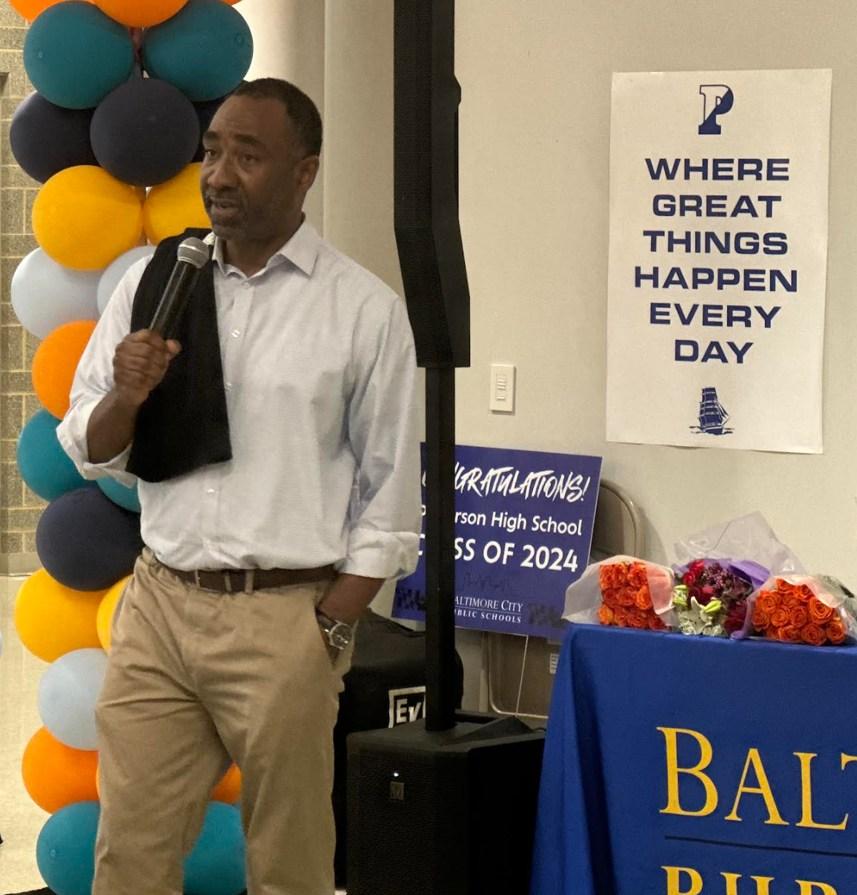
create environments where students can truly flourish.
"The Community School Summer Institute is a cornerstone of the Family League's efforts to support and empower our Community School Coordinators," said Demaune Millard, CEO of Family League. His words underscore the critical role these coordinators play in fostering equitable and supportive environments for all students.
The institute's agenda is as diverse as the communities it serves. Participants engage in over two dozen workshops, network with peers, share resources, and strategize for the upcoming school year. The air is charged with a sense of purpose and possibility.
But what exactly is a community school? At its core, it's a place that provides comprehensive support – from physical and mental health services to academic and extracurricular activities. It's a model that recognizes that a child's education doesn't exist in isolation from their broader life experiences.
Community School Coordinators
Community School Coordinators are the linchpins of this strategy. These full-time staff members serve as bridges, connecting diverse stakeholders and leveraging resources to meet their school community's needs.
“The collaboration between Baltimore City Public Schools, the Mayor’s Office, and Family League is instrumental in driving positive change and data-driven impact.”
SHEILA DRUMMOND CAMM,
Baltimore
City Public Schools, Community Schools Manager
commitment to addressing systemic inequities. "Together, we can explore innovative strategies to champion the next chapter of diversity, democracy, and community involving Baltimore schools," Dr. Brown remarked, setting the tone for two days of intense learning and collaboration.
The Blueprint for Maryland’s Future
The expansion of Community Schools in Baltimore is nothing short of remarkable. In recent years, the network has grown from 45 to 154 schools, bolstered by resources from the Blueprint for Maryland's Future. This year, nearly every school in Baltimore is a Community School, a testament to the strategy ' s profound impact and reach
Their role is complex, demanding, and utterly essential to the success of the community school model.
"The collaboration between Baltimore Public Schools, the Mayor's Office, and Family League is instrumental in driving positive change and data-driven impact," said Sheila Drummond-Camm, Baltimore City Public Schools Manager. This partnership ensures that every student has the resources they need to succeed, regardless of their background or circumstances. Anchored in focusing on the whole child, Family League supports Community School Coordinators functioning as the vital connective tissue between schools, families, and neighborhood assets, -continued on page 9
(LtoR) Sheila Drummond Camm, Community Schools Manager at Baltimore City Public Schools and Demaune A. Millard, President & CEO of Family League.

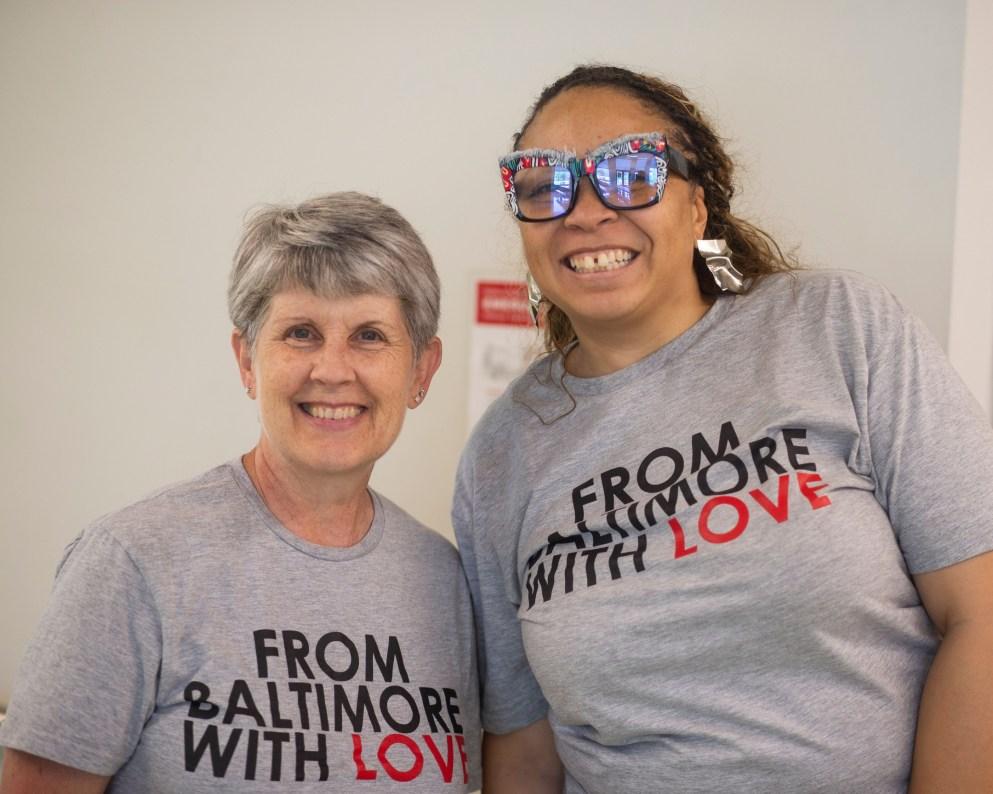

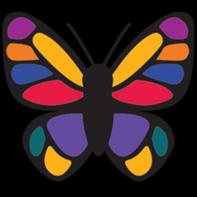
As Maryland’s largest designated Local Management Board, Family League leads the state in advancing the Community Schools strategy promoted by the Maryland State Department of Education (MSDE). With the support of the Blueprint for Maryland's Future Accountability & Implementation Board, Family League’s Community Schools portfolio has expanded significantly, growing from 45 to 154 schools in recent years. This year, nearly every school in Baltimore is a Community School, highlighting the initiative's profound impact and reach.
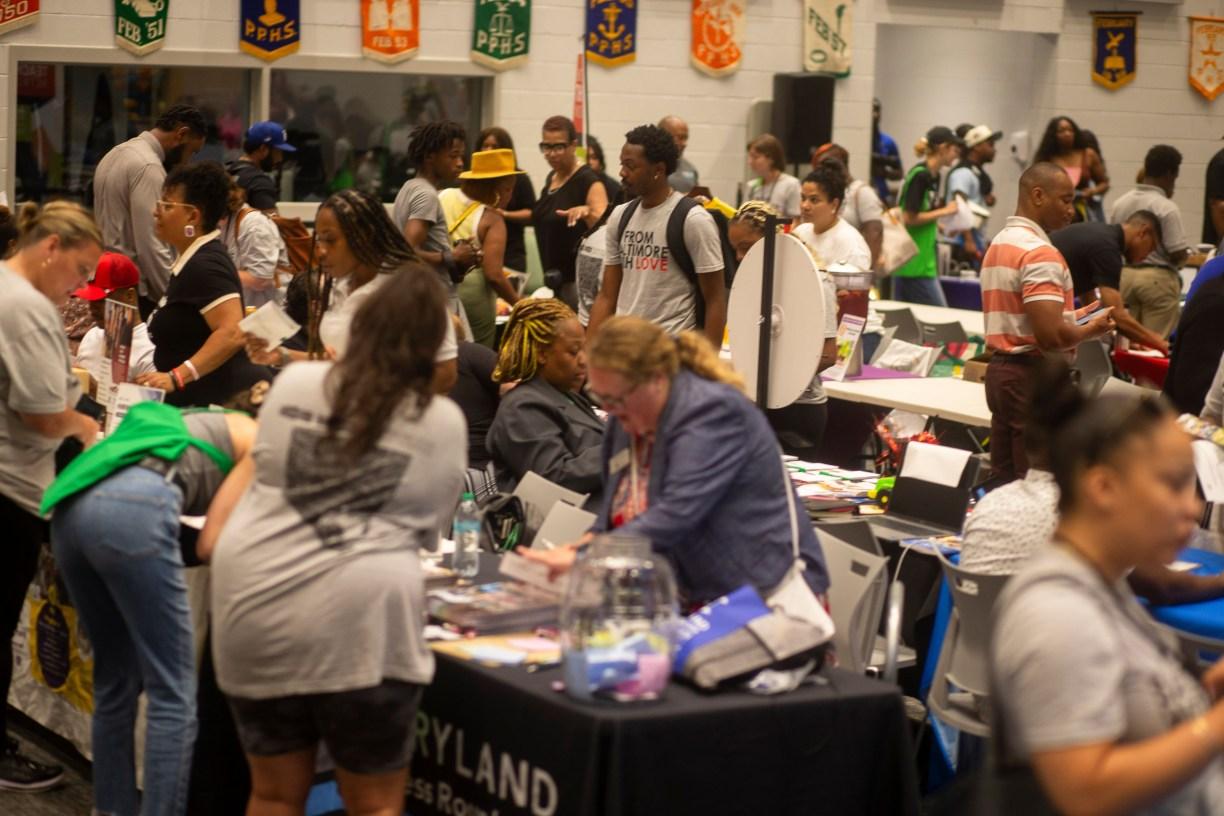

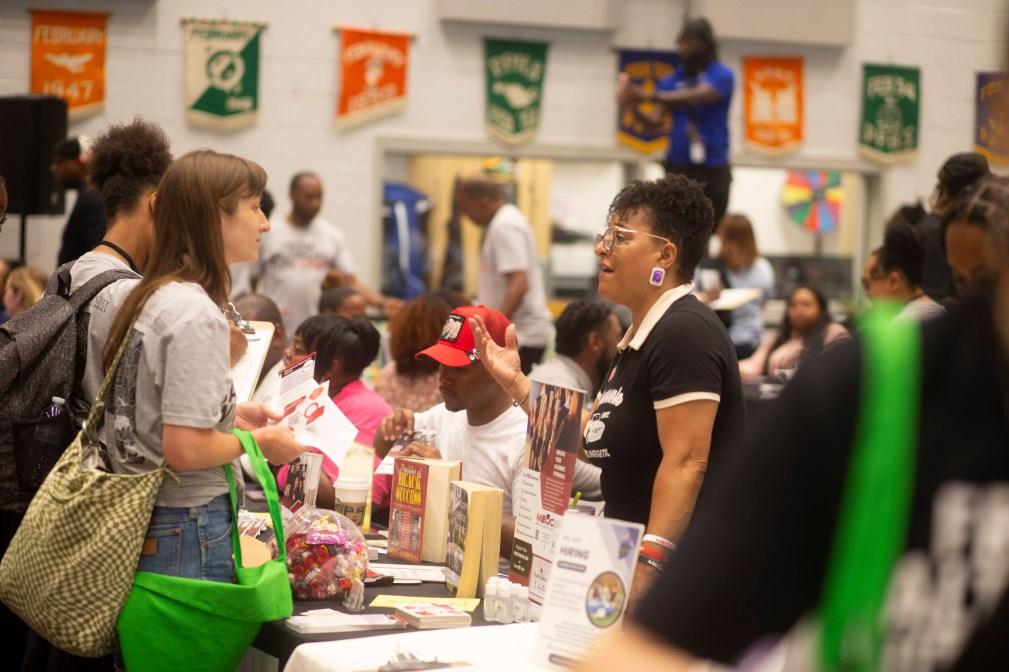

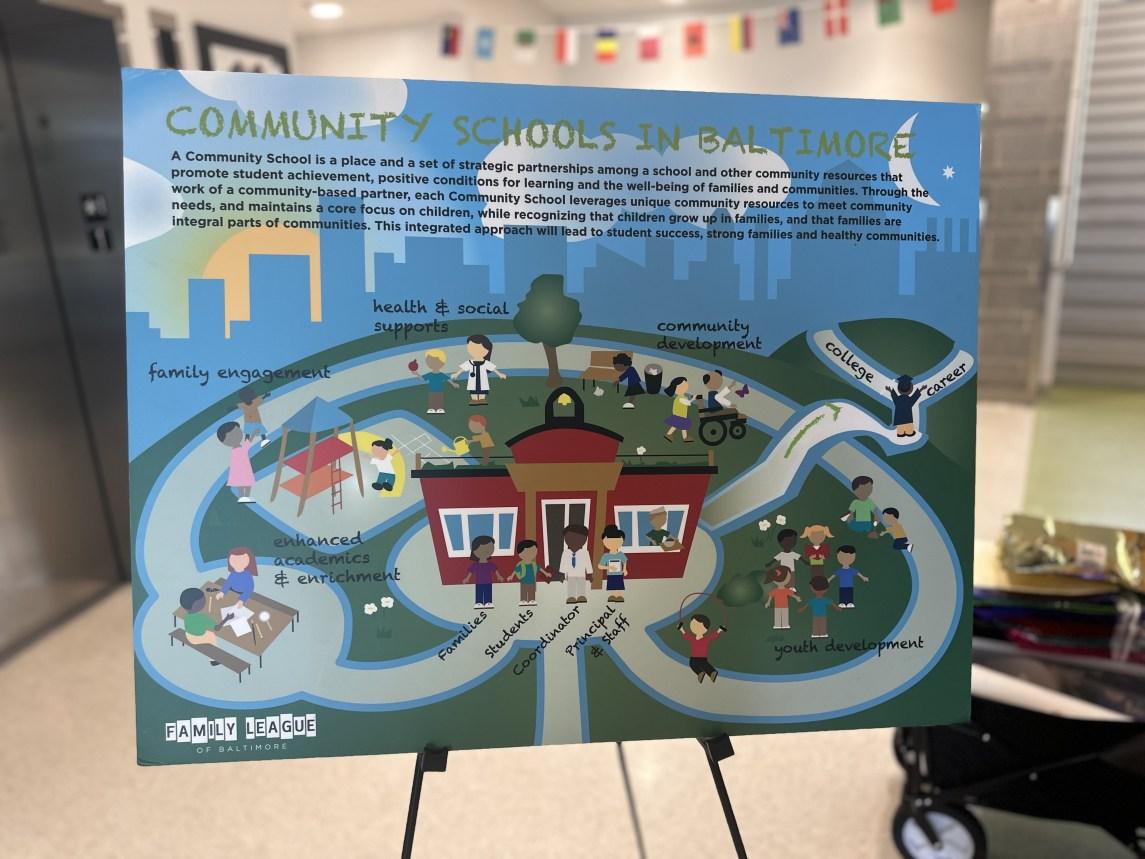


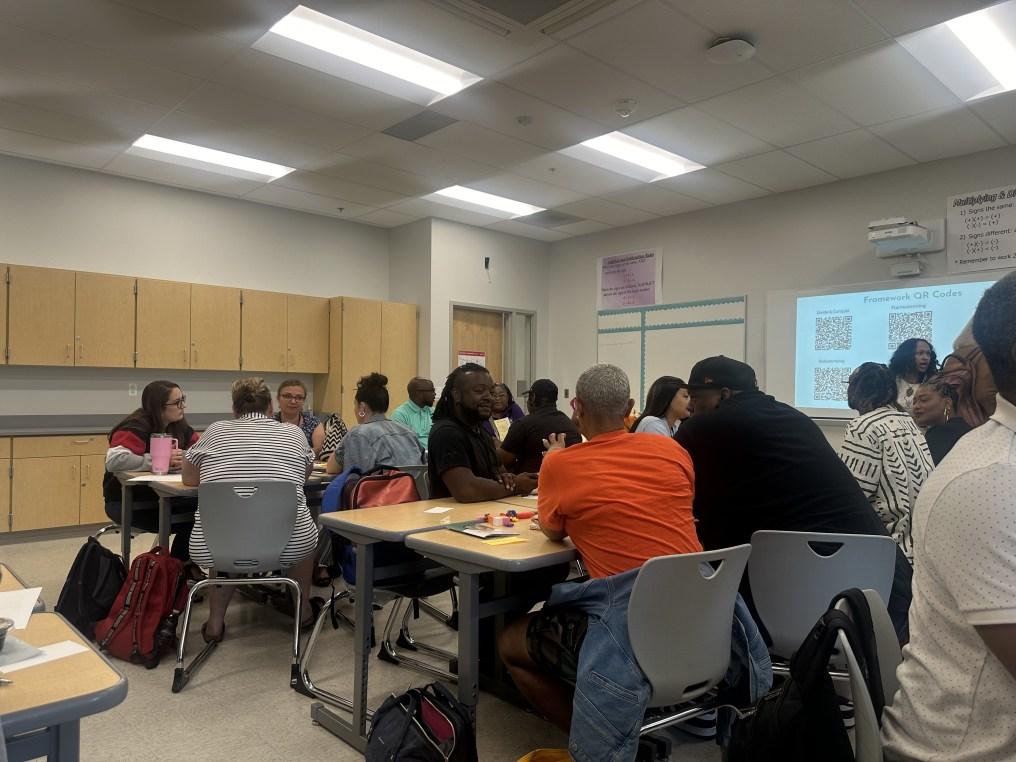
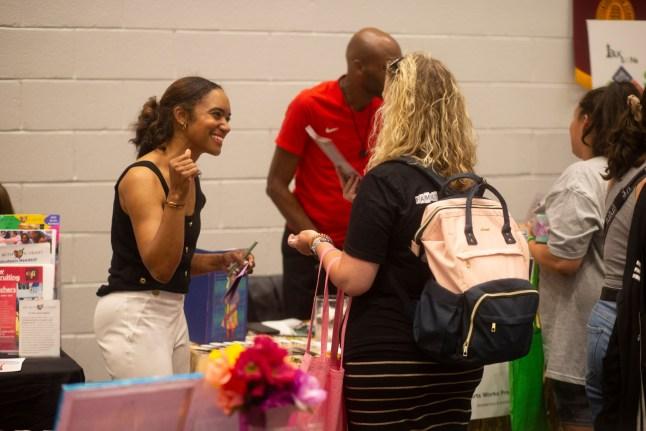

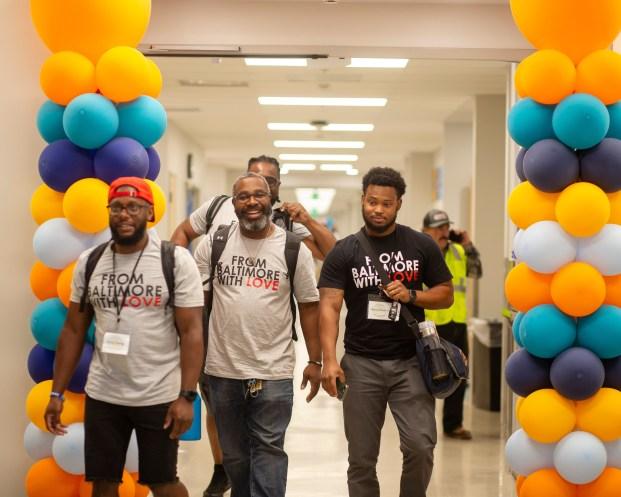
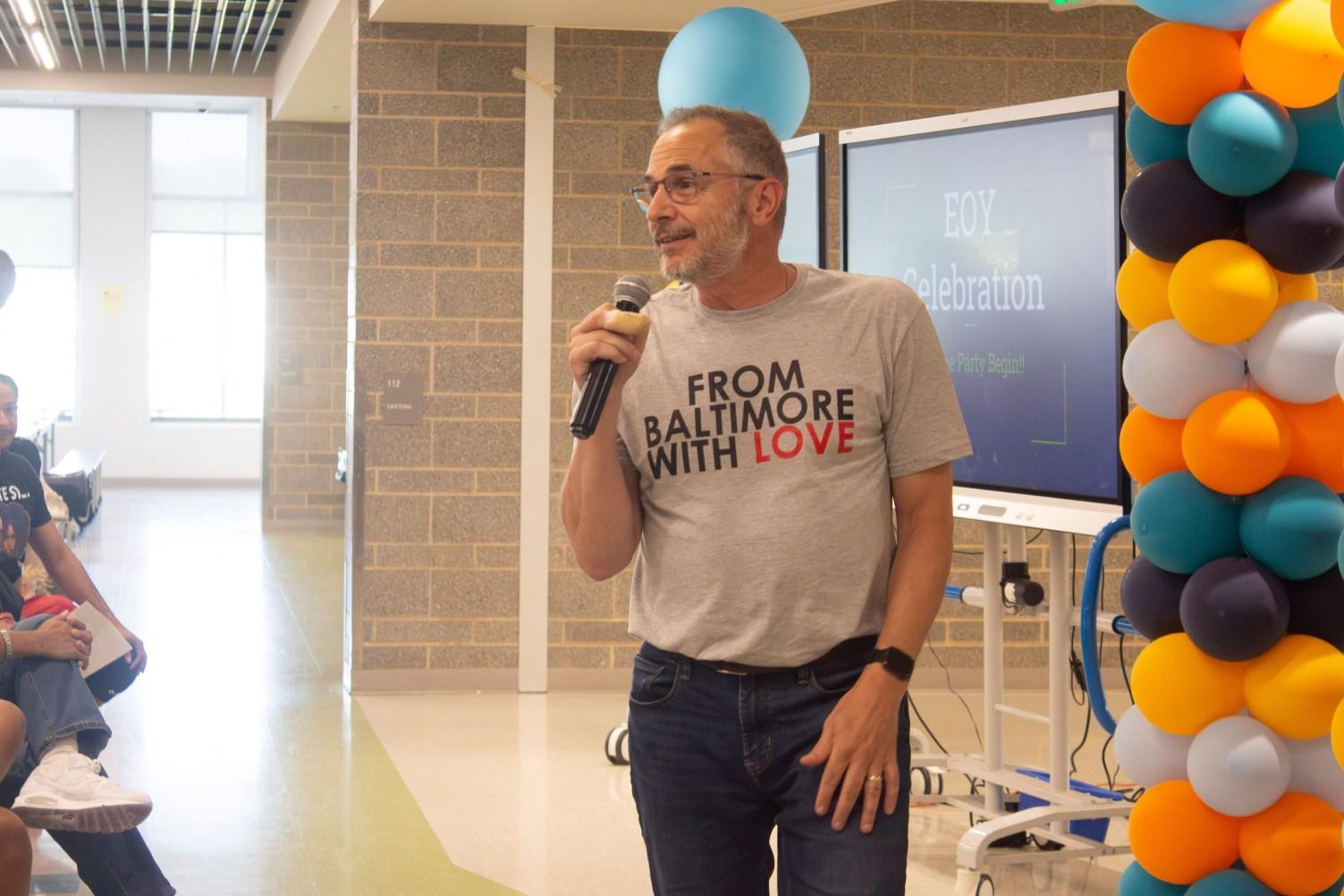

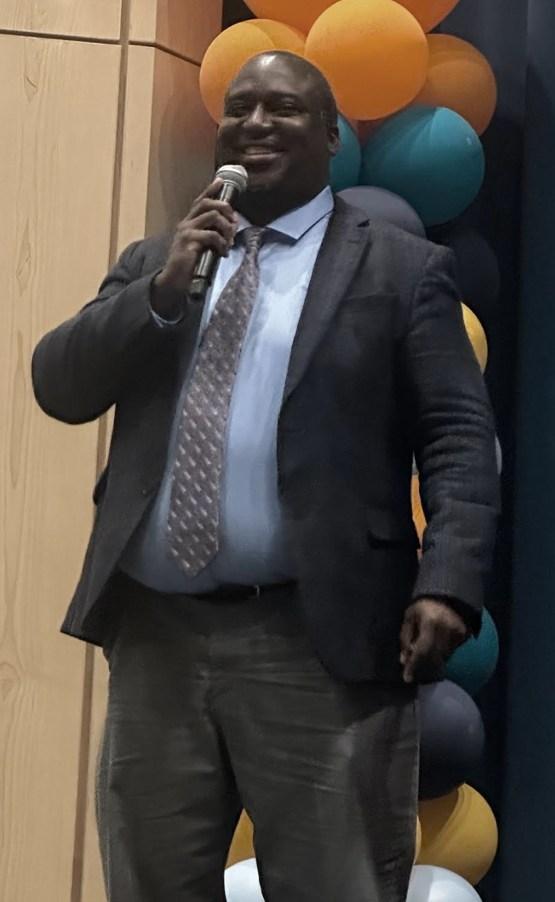


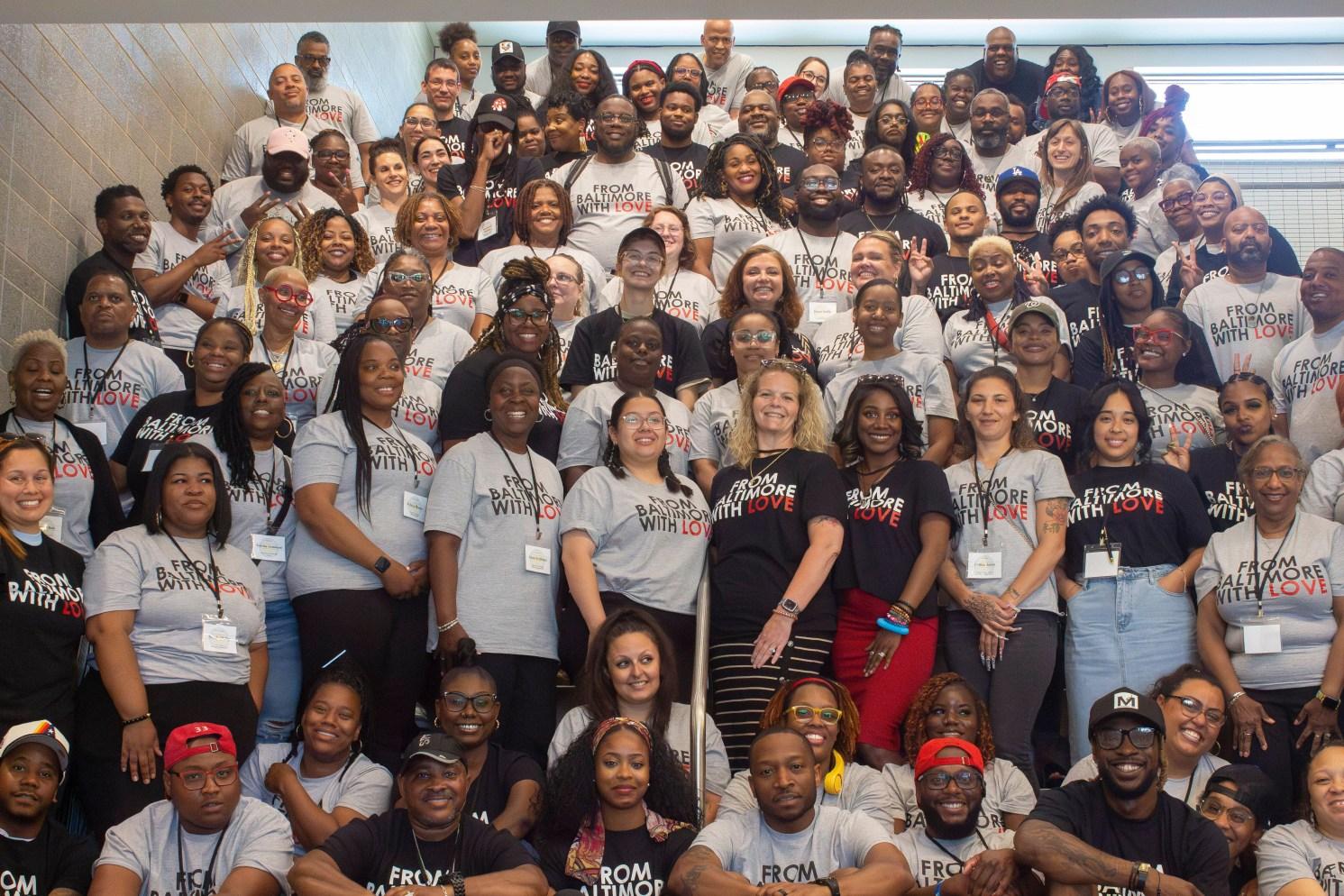
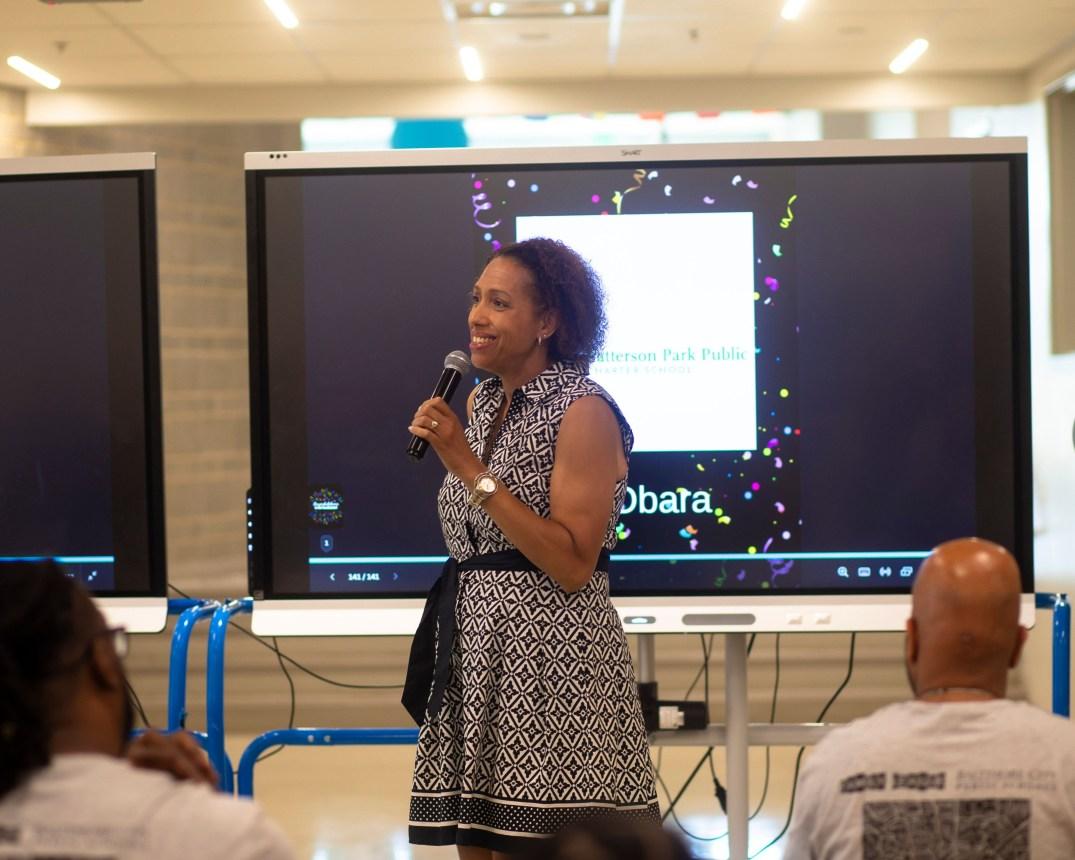
promoting data-driven, collaborative initiatives and aligning resources to create lasting outcomes for children, families, and communities.
The organization's impact is substantial. In the 2023 fiscal year alone, Family League provided $22.2 million to 81 community based partners, benefiting over 25,000 children, youth, and adults in Baltimore. These figures represent more than just financial investment; they represent hope, opportunity, and the potential for generational change.
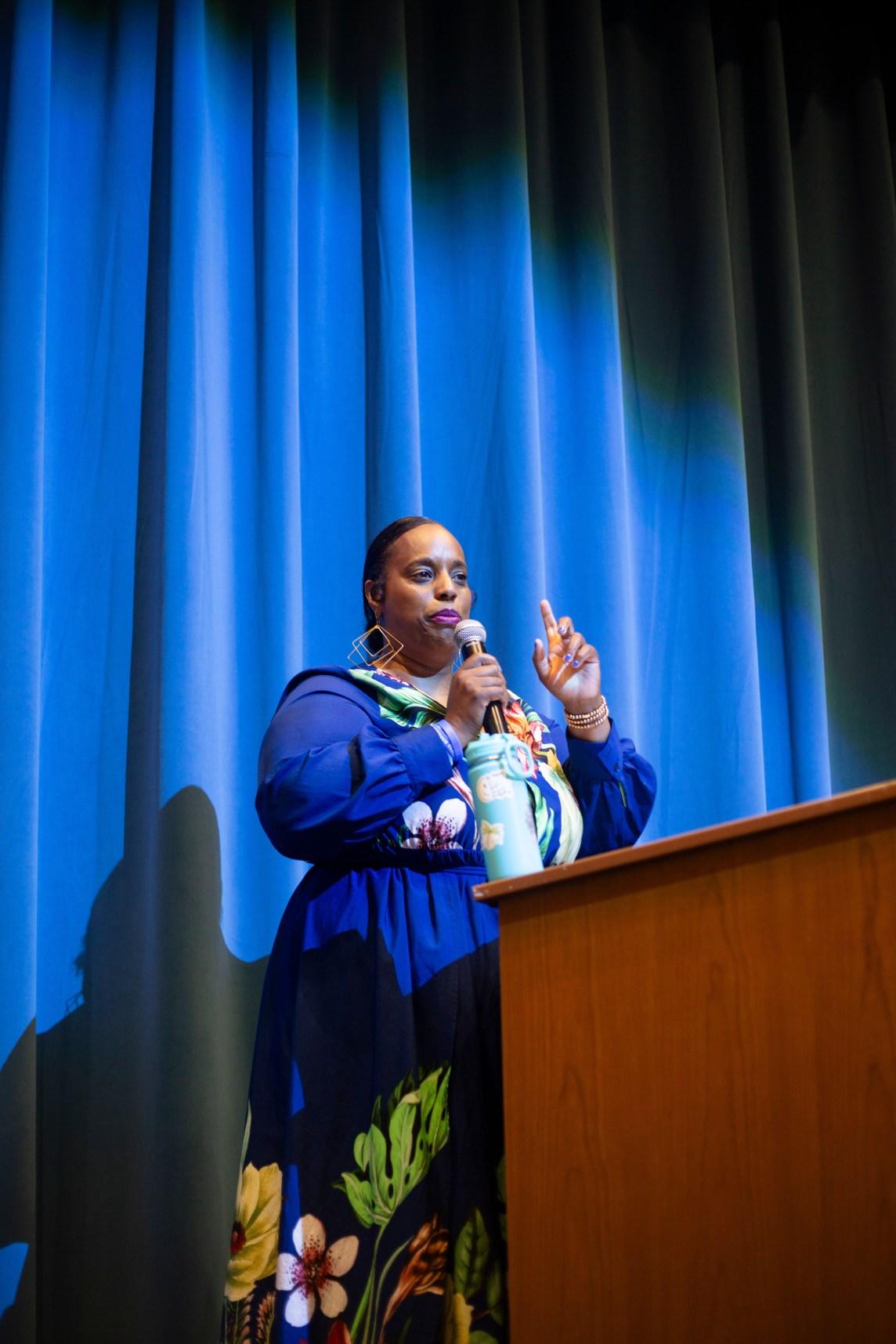
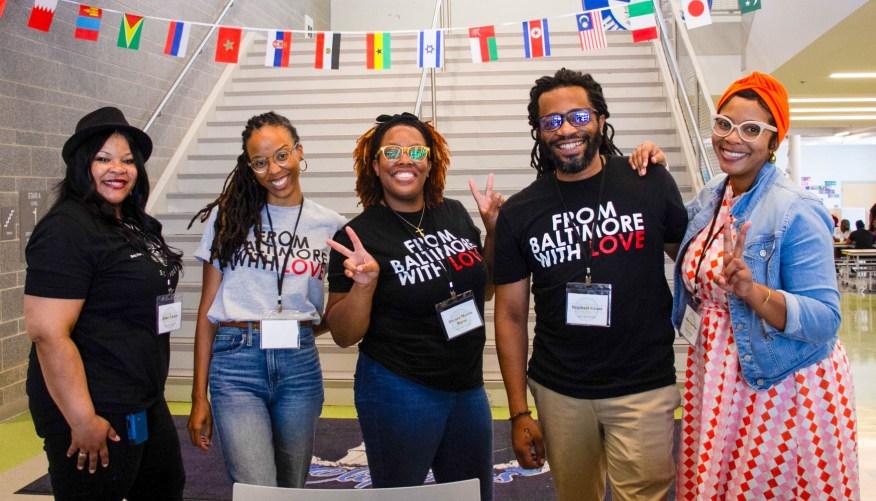

In the coming months and years, the impact of this gathering will ripple through Baltimore's schools and neighborhoods. It's a reminder that sometimes, the most profound changes start not with grand gestures, but with committed individuals coming together, sharing ideas, and working tirelessly to make a difference, one school and one student at a time.
As the Summer Institute unfolds, it's clear that Baltimore's Community Schools are more than just an educational strategy –they're a movement. A movement that recognizes the interconnectedness of education, health, community, and oppor-
vering commitment to the city's youth.
As the sun sets on Patterson High School at the end of the institute, the energy remains palpable. Community School Coordinators leave armed with new skills, fresh perspectives, and a renewed sense of purpose. They carry with them the hopes and dreams of countless students, families, and communities.
Baltimore's Community Schools stand as a beacon of what's possible when education is reimagined as a collaborative, community-wide endeavor. As this model continues to evolve and expand, it holds the promise of transforming not just education, but the very fabric of urban life in Baltimore and beyond.
(ABOVE, LtoR) Lawrence T. Brown of the Black Butterfly Project and a group photograph of Community Schools participants. (BELOW, LtoR) Tina Hubbard, Chief Communications and Engagement Officer for BCPS, Principal April Myrick of Patterson High School, and FamilyLeague team members Jenee Tucker, Danielle Tidline, Deyara Martin, Reginald Grant, and Tiffany Snead Rhodes.
Creating a Healthier Baltimore, One Family at a Time
BY MELISSA MOORE, FAMILY LEAGUE SR. DIRECTOR FOR COMMUNITY IMPACT
As we reflect over this past quarter, the B’More for Healthy Babies (BHB) initiative has seen significant strides across our programs, illustrating the profound impact of our community-driven efforts. From home visiting programs to advisory board activities, each initiative under our umbrella has contributed to building a healthier, more supportive environment for families in Baltimore.
Innovations in Home Visting
Our home visiting programs have been particularly dynamic this quarter. Funding continues to support over 275 participants with housing supports. In addition to offering vital services, home visiting programming is also a vehicle for layering in other

critical resources. Housing instability remains a consistent barrier for many Baltimore families. Homelessness and housing instability significantly increase the risk for low birthweight and preterm birth the leading cause of infant death in Baltimore – and increases the risk for neonatal intensive care unit admission and delivery complications. Funding has facilitated an innovative enhancement to HFA home visiting. As home visitors work with participants to develop Family Goal Plans, should housing-related needs be present, home visiting partners are then able to utilize funding to respond and provide families with resources to address their housing needs. Each participant’s needs are unique, and home visiting programs work closely with participants to support them to utilize the resource accordingly.
Supporting Families Through Transition and Growth
Family Tree’s team of newly-trained home visitors has begun their crucial work with families, even amidst staffing transitions. The departure of their Assistant Director of Family Support Services was met with a seamless interim arrangement, thanks to the collaborative efforts of the Executive Director and other key leaders, supported by the Family League. This stability ensures that families continue to receive consistent and high-quality support.
Melissa Moore is the Senior Director of Community Impact at Family League, where she oversees the organization’s initiatives in maternal and child health, food justice, adaptive village, and interagency investments. In this pivotal role, Melissa ensures the effective implementation of Family League’s mission through strategic leadership and dedicated service.
Since joining Family League in 2012, Melissa has been recognized with the Mayor’s Medallion for Meritorious Service and has demonstrated a strong commitment to enhancing operational efficiencies and fostering a culture aligned with the organization’s core values. A UMBC graduate and a certified Project Management Professional (PMP), Melissa combines her extensive experience with a passion for stewardship.
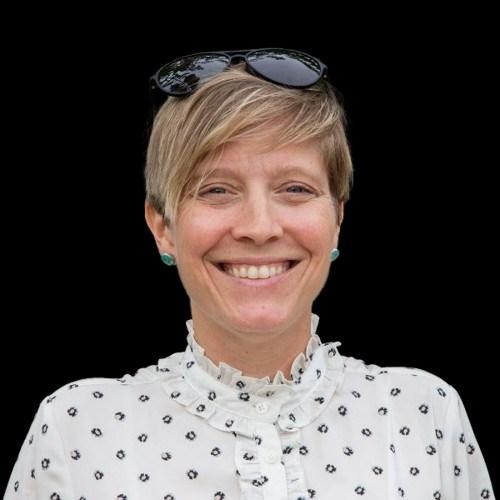

The Family Tree and DRUM Healthy Families have both hosted pivotal site visits. The Family Tree's interaction with the Maryland Department of Health highlighted their innovative approaches, such as incorporating financial education classes and leveraging technology for recruitment and enrollment. These efforts have not only enhanced service delivery but have also empowered families to make informed financial decisions and engage more seamlessly with our programs.
Similarly, DRUM Healthy Families showcased resilience and community impact during their Healthy Families America (HFA) accreditation site visit, the first since the passing of their Executive Director, Kimberli Hammonds. Despite technical challenges, the team demonstrated their integral role in the community and their unwavering commitment to supporting families. Their continued efforts, including productive Turn the Curve conversations and professional development participation, underscore their dedication to maintaining high standards of care.
Sinai Hospital’s recent accreditation from HFA and their successful community outreach efforts further exemplify the strength of our home visiting programs. Their ability to convert referrals into enrollments and meet postpartum visit targets through intensive follow-ups and transportation coordination is commendable. The upcoming trip to Sesame Place with families is a testament to their commitment to celebrating milestones together.
Baltimore Healthy Start’s provision of housing and moving assistance to families has alleviated significant stress for new and expectant mothers. Additionally, their dyad care model in partnership with Total Health Care has effectively addressed barriers to postpartum appointments, a common challenge across our network.
Prioritizing Mental Health and Self-Care
In recognition of Mental Health Awareness month in May, the BHB home visiting network dedicated efforts to sharing mental health resources and practicing self-care.
The BHB Refresh event at the Reginald F. Lewis Museum of African American History and Culture was a highlight, offering various self-care activities and fostering a supportive community atmosphere. This event not only provided a much-needed break for home visitors but also strengthened connections within the BHB network.
Healing and Connection Through the HOPE Project and Baby Basics
The HOPE Project’s new staff began conducting home visits this quarter, successfully enrolling new participants while continuing to offer support groups and additional programming. Notably, their paint night for couples, facilitated by a Licensed Clinical Social Worker, provided a meaningful space for expression and healing. In supporting families through grief the initiative has been foster deeper connections within the visitation process.
Our Baby Basics groups offered both inperson and virtual sessions in English and Spanish. Both the use of the Development Milestone’s checklist and the creation Of a new tool has improved the referral process and advanced program effectiveness.
MEET MELISSA MOORE
Family League invests in strategies and initiatives to create lasting change for children and families. To do this, we work with an array of program partners who seek to transform communities and achieve sustainable impact in the areas: child and mental health, education, youth development, nutrition, and child welfare.
Supporting Community Through Outreach and Events
BHB Upton/Druid Heights coordinated the Huddle, a male engagement initiative centralizing barbershops as intervention hubs. Huddle partners included Cut Styles, New Illusions, Safe Streets, and the Mayor’ s Office of Neighborhood Safety and Engagement. The framework of crossgenerational educational sessions were well received by participants. Discussed topics included: safety and protection of Black boys and men and Black boy joy for mental wellbeing.
The BHB Community Advisory Board finalized its bylaws and governance practices over the summer. In doing this, the board founded consensus on group branding and external communications going forward.
By leveraging their community knowledge, the CAB is helping to weave local resources into the BHB landscape, ensuring our initiatives reach those who need them most. As we look forward, we remain dedicated to our mission of creating a healthier Baltimore, one family at a time. Through innovation, resilience, and community engagement, we are paving the way for a brighter future for all Baltimore families.
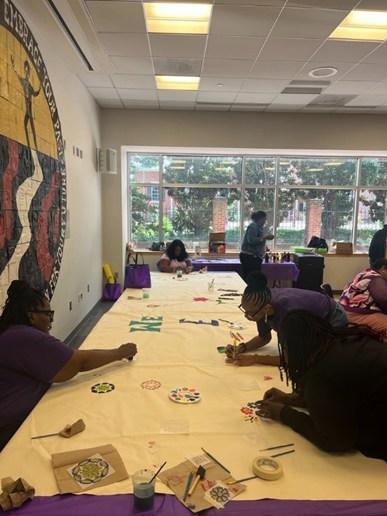
B’MORE FOR HEALTHY BABIES (BHB) REFRESH

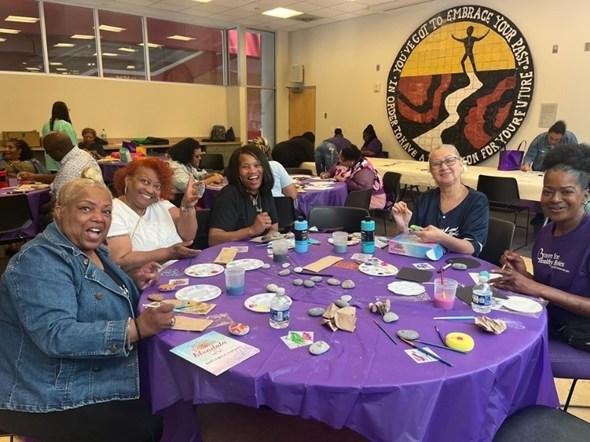


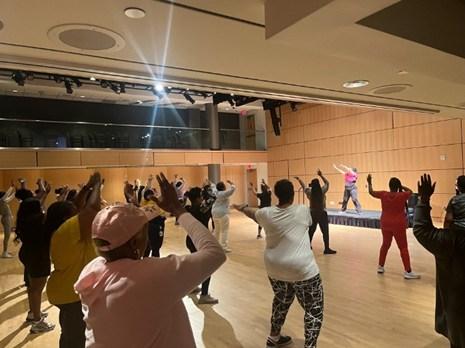
(ABOVE) BHB Refresh event attendees enjoying mandala rock painting at the Reginald F. Lewis Museum of African American History and Culture. (BELOW, LtoR) BHB Refresh event attendees working on a mural together and enjoying Zumba class.
Interagency Initiatives
Family Stability Program (FSP)
FSP at Family Connections Baltimore (FCB) focused on mitigating the challenges faced by families due to structural racism and oppression. Dedicated staff and Master of Social Work (MSW) interns provided essential services such as housing, transportation education, healthcare, and resource brokering.
FSP is set to move into new space at 940 Madison Aves by early July and continues to onboard new social workers. FCB staff participated in Narcan training, expanded partnerships with RISE for housing and eviction prevention assistance, and hosted a fourday SHARP Framework workshop at UMD Baltimore.
Baltimore City Local Care Team (LCT)
In April, May, and June, Baltimore LCT received 23 unique referrals, surpassing its FY24 referral target. Team participated in state LCT peer group meetings.
Youth Services Bureau (YSB)
KEYS Empowers provided vital services, accepted program referrals, and facilitated a YouthWorks cohort from June to August, despite navigating funding challenges. Formed new partnerships with Building Communities for Today Tomorrow (BCTT) and is currently working to secure additional funding to deliver services. Thriving Youth Programs (TYP)
TYP continued support for Baltimore Brothers, The Choice Program, Mayor’s Office of African American Male Engagement (MOAAME), and New Vision Youth Services (NVYS). Each program made significant strides in supporting and empowering young people most at-risk of justice system involvement.
Family Recovery Program (FRP)
FRP served 119 parents involving judicial oversight, substance use disorder management, and other support services; and launched an on-site Reproductive Health Clinic.
• Hosted the Sage Awards and Mother’s Day celebration. FRP secured new space within Department of Social Services and hosted a Walk-A –Thon for families in need.

2305 N Charles Street
Suite 200
Baltimore, MD 21218
(410) 662-5500 familyleague.org
Family League of Baltimore is a 501(c)(3) nonprofit organization and the designated Local Management Board for the City of Baltimore. Since 1991, it has served as an architect of change by promoting datadriven, collaborative initiatives and aligning resources to create lasting outcomes for children, families, and communities.
Community Schools, Out-of-School Time
Booker T. Washington Middle School | University of Maryland, Center for Restorative Change
Held three monthly food distribution events, serving over 50 families ; and recognized local partners monthly for their support and contributions..
Hosted the 3rd Annual HBCU Pep Rally, featuring 10 college student-led organizations and swag from HBCUs; and organized college tours for eight graders to Morgan State University, Bowie State University, and Howard University.
Supported an Aladdin on Broadway trip for the school arts department and students as part of their preparation for their spring show of the Lion King Jr.
Forum for Youth Investment | Weikart Center
Facilitated training sessions for OST Site Managers to advance quality modeling and program improvement planning utilizing Weikart’s Youth Program Quality Intervention (YPQI) tools.
Advanced quality improvement with self-assessment and external assessment efforts across the 2024 OST Expansion catchment.
Child First Authority | Morgan State University
Showcased Baltimore City Schools student talent at the 18th Annual “Show What You Know” event and attracted over 700 attendees to experience celebrated displays of dance, choir, drumline, poetry.
Brought together parents, teachers, local supporters to strengthen community bonds and champion the impact of student accomplishment.
BOARD OF DIRECTORS
Nancy Blackwell, Chair
Nicole Earle, Treasurer
Barry S. Solomon, MD, MPH, Secretary
Ben Perez
Ramsey L. Harris
Joshua M. Sharfstein, MD
Ex-Officio Members
Debra Y. Brooks, Ed.D Mayor’s Office of Children and Family Success
Tina Hike-Hubbard, Baltimore City Public Schools
Charles Jackson, Baltimore City Health Department
Demaune Millard, Family League
Corrine Mullings, LMSW, Baltimore City Department of Social Services
Anjelene Branch, Baltimore City Department of Juvenile Services
Lynn Mumma, Behavioral Health Systems Baltimore
LEADERSHIP TEAM
Demaune Millard President & CEO
Keianna Thompson Chief Financial Officer
Jonathan Carter Chief of Staff

Jenee Tucker
Sr. Director for Community Impact
Melissa Moore
Sr. Director for Community Impact
Dara Gray
Sr. Director of Innovation and Technology
GET SOCIAL WITH

linkedin.com/company/family-league

Family League of Baltimore

@family_league

@Family_League
